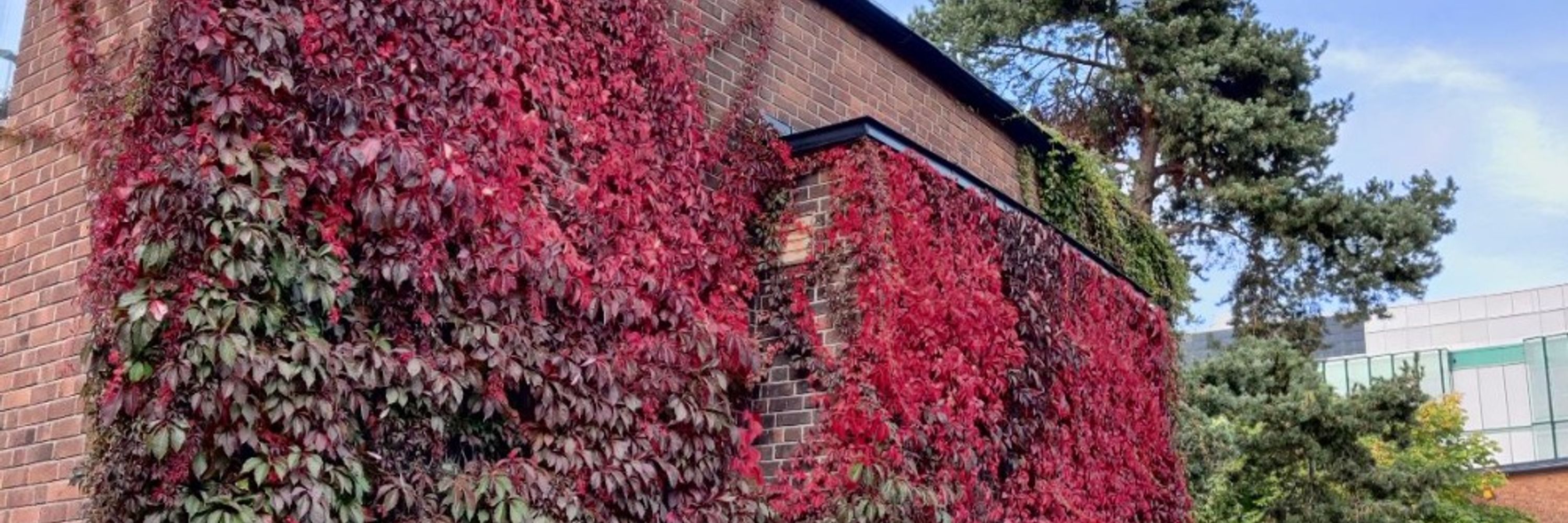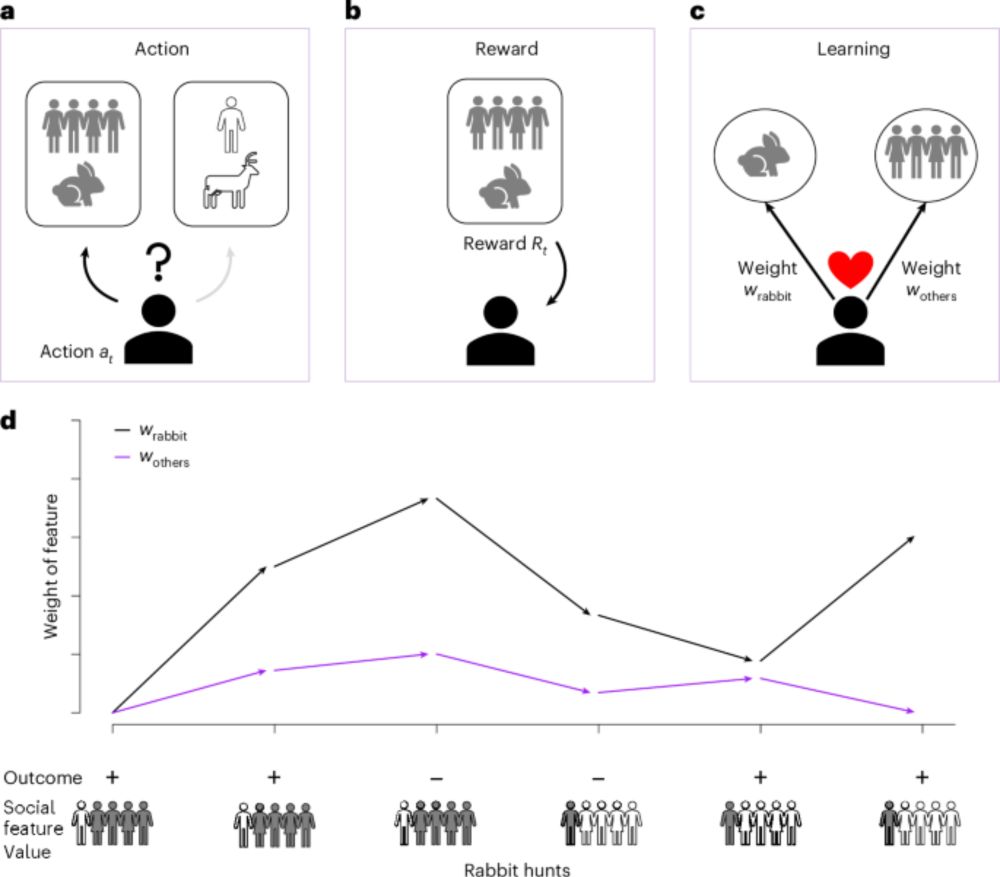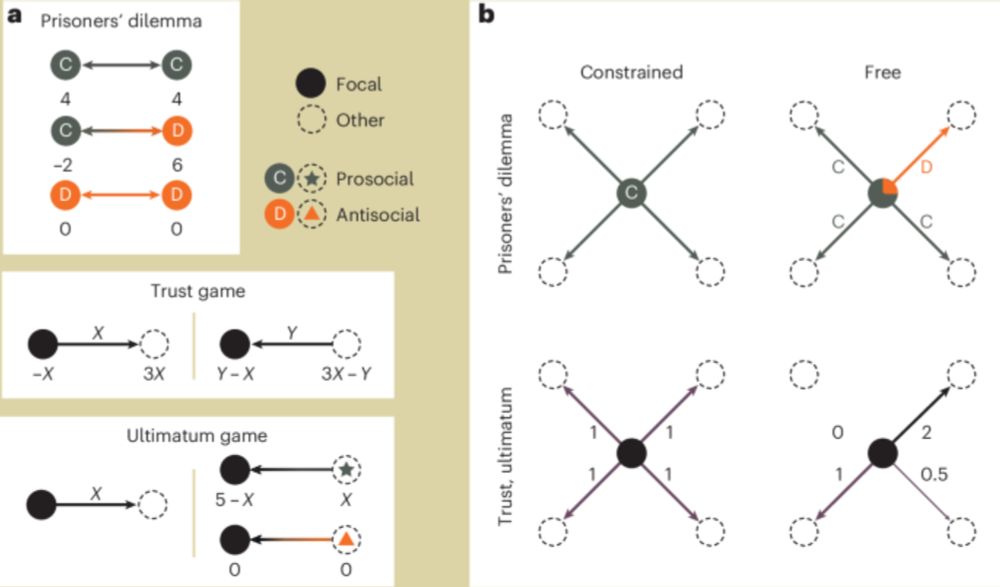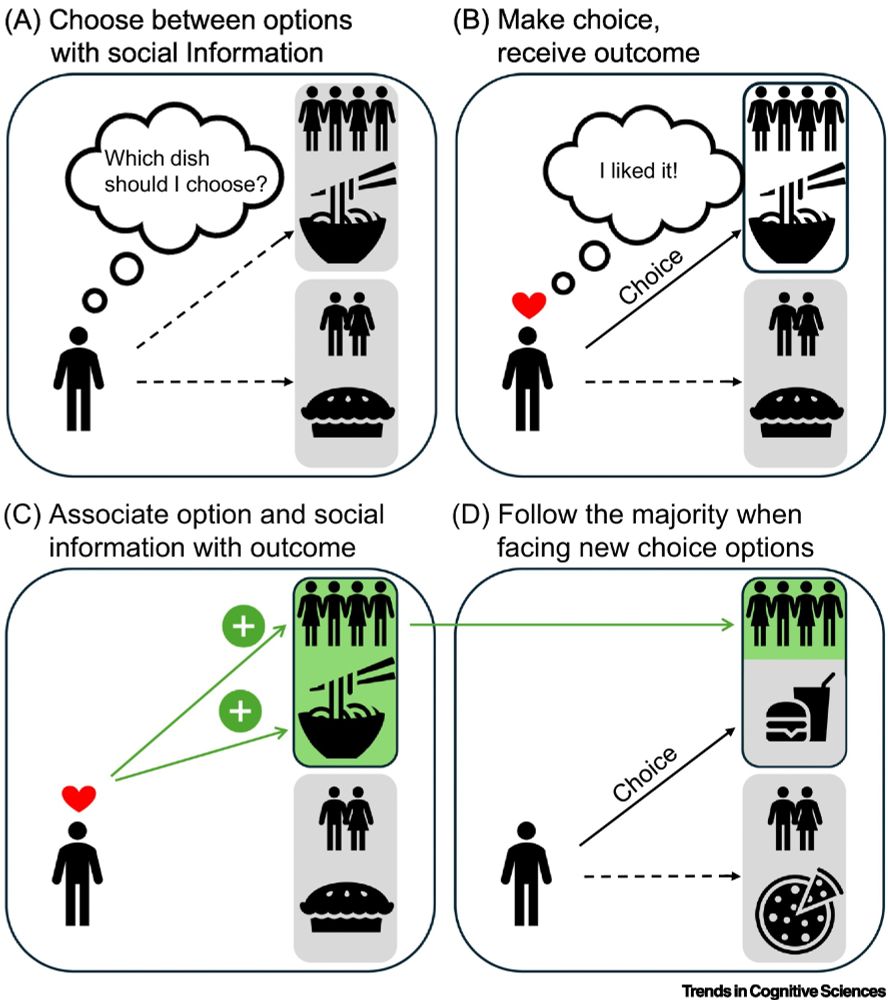
Björn Lindström
@bjornlindstrom.bsky.social
Researching (social) learning and cultural evolution at Karolinska Institute, Sweden
Pinned
Through experiments and simulations, this study shows how individuals learn to learn from others, dynamically shaping the processes involved in cultural evolution. @davidschultner.bsky.social @bjornlindstrom.bsky.social
@lucasmolleman.bsky.social
www.nature.com/articles/s41...
@lucasmolleman.bsky.social
www.nature.com/articles/s41...

Feature-based reward learning shapes human social learning strategies - Nature Human Behaviour
This research advances a mechanistic reward learning account of social learning strategies. Through experiments and simulations, it shows how individuals learn to learn from others, dynamically shapin...
www.nature.com
Thrilled that our paper on the mechanisms underlying social learning strategies is out! First big paper from my @erc.europa.eu & @kawresearch.bsky.social funded group. More to come! I'm currently looking to recruit two post docs, get in touch if you find this line of research interesting.
Reposted by Björn Lindström
Join us for this talk by @janhaaker.bsky.social on "A functional view on how we respond to others’ pain: Empathy, threat learning and neuropeptides"
11 November, 1pm CET
tu-dresden.de/mn/psycholog...
11 November, 1pm CET
tu-dresden.de/mn/psycholog...

November 10, 2025 at 9:11 PM
Join us for this talk by @janhaaker.bsky.social on "A functional view on how we respond to others’ pain: Empathy, threat learning and neuropeptides"
11 November, 1pm CET
tu-dresden.de/mn/psycholog...
11 November, 1pm CET
tu-dresden.de/mn/psycholog...
Reposted by Björn Lindström
Just 1 week to apply! 4 year @erc.europa.eu funded PhD position working in an interdisciplinary team to study #culturalEvolution as a process of reuse, recombination, and creative re-engineering of past solutions. Details 👉 hmc-lab.com/ERCPhDCultur... 🙏Please share!

November 5, 2025 at 10:24 AM
Just 1 week to apply! 4 year @erc.europa.eu funded PhD position working in an interdisciplinary team to study #culturalEvolution as a process of reuse, recombination, and creative re-engineering of past solutions. Details 👉 hmc-lab.com/ERCPhDCultur... 🙏Please share!
Reposted by Björn Lindström
🚨 New preprint 🚨
Are reinforcement learning models complete accounts of decisions from experience if they ignore explicit memory?
In this new preprint, we show that people indeed form robust explicit memory representations that flexibly guide later decisions.
🔗 Preprint: doi.org/10.1101/2025...
Are reinforcement learning models complete accounts of decisions from experience if they ignore explicit memory?
In this new preprint, we show that people indeed form robust explicit memory representations that flexibly guide later decisions.
🔗 Preprint: doi.org/10.1101/2025...

October 29, 2025 at 8:24 AM
🚨 New preprint 🚨
Are reinforcement learning models complete accounts of decisions from experience if they ignore explicit memory?
In this new preprint, we show that people indeed form robust explicit memory representations that flexibly guide later decisions.
🔗 Preprint: doi.org/10.1101/2025...
Are reinforcement learning models complete accounts of decisions from experience if they ignore explicit memory?
In this new preprint, we show that people indeed form robust explicit memory representations that flexibly guide later decisions.
🔗 Preprint: doi.org/10.1101/2025...
Reposted by Björn Lindström
Re-posting this because I really like it and I think we need to understand identity from a functionalist perspective more than ever.
osf.io/preprints/ps...
osf.io/preprints/ps...
I wrote a chapter on a functionalist account of social identity.
IMO, thinking about identity in an instrumental way helps explain a lot of behavior that seems otherwise baffling.
osf.io/preprints/ps...
IMO, thinking about identity in an instrumental way helps explain a lot of behavior that seems otherwise baffling.
osf.io/preprints/ps...

October 27, 2025 at 8:11 PM
Re-posting this because I really like it and I think we need to understand identity from a functionalist perspective more than ever.
osf.io/preprints/ps...
osf.io/preprints/ps...
Reposted by Björn Lindström
I'm excited to finally have a preprint of this paper up, a few years in the making.
In it we argue that industry-driven manipulation of social media research is well underway and that norms and institutions in the field are ill-prepared to resist tech's influence.
arxiv.org/abs/2510.19894
In it we argue that industry-driven manipulation of social media research is well underway and that norms and institutions in the field are ill-prepared to resist tech's influence.
arxiv.org/abs/2510.19894
October 24, 2025 at 12:12 AM
I'm excited to finally have a preprint of this paper up, a few years in the making.
In it we argue that industry-driven manipulation of social media research is well underway and that norms and institutions in the field are ill-prepared to resist tech's influence.
arxiv.org/abs/2510.19894
In it we argue that industry-driven manipulation of social media research is well underway and that norms and institutions in the field are ill-prepared to resist tech's influence.
arxiv.org/abs/2510.19894
Reposted by Björn Lindström
Fully-funded 4-year #PhD in Cultural Evolution! Join my @erc.europa.eu project exploring how compression & compositionality drive cultural innovation: hmc-lab.com/ERCPhDCultur...
Apply by Nov 12!
Maybe of interest to folks from #COSMOS2025 or @eslr.bsky.social? Please feel free to share! 🙏
Apply by Nov 12!
Maybe of interest to folks from #COSMOS2025 or @eslr.bsky.social? Please feel free to share! 🙏
ERC funded PhD position on Cultural Evolution
ERC funded PhD position on Cultural Evolution
posted on October 16, 2025
We are currently seeking a highly motivated individual for a ful...
hmc-lab.com
October 20, 2025 at 9:32 AM
Fully-funded 4-year #PhD in Cultural Evolution! Join my @erc.europa.eu project exploring how compression & compositionality drive cultural innovation: hmc-lab.com/ERCPhDCultur...
Apply by Nov 12!
Maybe of interest to folks from #COSMOS2025 or @eslr.bsky.social? Please feel free to share! 🙏
Apply by Nov 12!
Maybe of interest to folks from #COSMOS2025 or @eslr.bsky.social? Please feel free to share! 🙏
Reposted by Björn Lindström
Very thought-provoking post by @prakhargodara.bsky.social. Is confirmation bias/positivity bias a statistical "ghost" of model specification? Specifically not including temporally decaying learning rates? The evidence suggests this is not the case and here is why (1/n)
Is confirmation bias a real cognitive flaw, or a statistical ghost created by our models? My new PNAS paper shows a startling result: fitting Q-learning models to behavior in bandit tasks detect a bias, even from the behavior of a perfectly rational Bayesian learner.
October 19, 2025 at 8:22 AM
Very thought-provoking post by @prakhargodara.bsky.social. Is confirmation bias/positivity bias a statistical "ghost" of model specification? Specifically not including temporally decaying learning rates? The evidence suggests this is not the case and here is why (1/n)
How do humans keep inventing tools and technologies that no single person could create alone?
Our new preprint, led by
@anilyaman.bsky.social & @ts-brain.bsky.social
shows that semantic knowledge guides innovation and drives cultural evolution. 🧠📘 arxiv.org/abs/2510.12837
Our new preprint, led by
@anilyaman.bsky.social & @ts-brain.bsky.social
shows that semantic knowledge guides innovation and drives cultural evolution. 🧠📘 arxiv.org/abs/2510.12837

October 16, 2025 at 1:49 PM
How do humans keep inventing tools and technologies that no single person could create alone?
Our new preprint, led by
@anilyaman.bsky.social & @ts-brain.bsky.social
shows that semantic knowledge guides innovation and drives cultural evolution. 🧠📘 arxiv.org/abs/2510.12837
Our new preprint, led by
@anilyaman.bsky.social & @ts-brain.bsky.social
shows that semantic knowledge guides innovation and drives cultural evolution. 🧠📘 arxiv.org/abs/2510.12837
Reposted by Björn Lindström
Which processes underlie collective intelligence in naturalistic human groups?
In new work led by Valerii Chirkov, we show that payoff selectivity is key in transforming a group of individuals into an intelligent collective 🤝🧠
www.youtube.com/watch?v=xY7n...
Preprint: osf.io/preprints/ps...
In new work led by Valerii Chirkov, we show that payoff selectivity is key in transforming a group of individuals into an intelligent collective 🤝🧠
www.youtube.com/watch?v=xY7n...
Preprint: osf.io/preprints/ps...

First-Person Perspective of the Voluntary Payoff-Sharing (VP) Condition
YouTube video by Valerii Chirkov
www.youtube.com
October 15, 2025 at 7:26 AM
Which processes underlie collective intelligence in naturalistic human groups?
In new work led by Valerii Chirkov, we show that payoff selectivity is key in transforming a group of individuals into an intelligent collective 🤝🧠
www.youtube.com/watch?v=xY7n...
Preprint: osf.io/preprints/ps...
In new work led by Valerii Chirkov, we show that payoff selectivity is key in transforming a group of individuals into an intelligent collective 🤝🧠
www.youtube.com/watch?v=xY7n...
Preprint: osf.io/preprints/ps...
Reposted by Björn Lindström
"Dunbar's Number" is a zombie that lives forever in the science press it seems. Estimates of Dunbar's Number with 95% intervals, for a range of model specifications (from doi.org/10.1098/rsbl... ):

October 14, 2025 at 5:51 PM
"Dunbar's Number" is a zombie that lives forever in the science press it seems. Estimates of Dunbar's Number with 95% intervals, for a range of model specifications (from doi.org/10.1098/rsbl... ):
Reposted by Björn Lindström
Our paper in annual review of dev psych is out! It's a big-picture look at the development of social cognition from a computational perspective: compdevlab.yale.edu/docs/2025/an...
compdevlab.yale.edu
October 9, 2025 at 3:21 PM
Our paper in annual review of dev psych is out! It's a big-picture look at the development of social cognition from a computational perspective: compdevlab.yale.edu/docs/2025/an...
Reposted by Björn Lindström
I'm recruiting grad students!! 🎓
The CoDec Lab @ NYU (codec-lab.github.io) is looking for PhD students (Fall 2026) interested in computational approaches to social cognition & problem solving 🧠
Applications through Psych (tinyurl.com/nyucp) are due Dec 1. Reach out with Qs & please repost! 🙏
The CoDec Lab @ NYU (codec-lab.github.io) is looking for PhD students (Fall 2026) interested in computational approaches to social cognition & problem solving 🧠
Applications through Psych (tinyurl.com/nyucp) are due Dec 1. Reach out with Qs & please repost! 🙏
codec lab
codec-lab.github.io
October 6, 2025 at 2:26 PM
I'm recruiting grad students!! 🎓
The CoDec Lab @ NYU (codec-lab.github.io) is looking for PhD students (Fall 2026) interested in computational approaches to social cognition & problem solving 🧠
Applications through Psych (tinyurl.com/nyucp) are due Dec 1. Reach out with Qs & please repost! 🙏
The CoDec Lab @ NYU (codec-lab.github.io) is looking for PhD students (Fall 2026) interested in computational approaches to social cognition & problem solving 🧠
Applications through Psych (tinyurl.com/nyucp) are due Dec 1. Reach out with Qs & please repost! 🙏
Reposted by Björn Lindström
Am slowly making my way through this paper. And it is an impressive body of work by a collection of great researchers.
However, I have a couple of problems with it...
1/n
However, I have a couple of problems with it...
1/n
Benchmarks for Associative Learning Models: https://osf.io/qsgz8
October 7, 2025 at 6:39 AM
Am slowly making my way through this paper. And it is an impressive body of work by a collection of great researchers.
However, I have a couple of problems with it...
1/n
However, I have a couple of problems with it...
1/n
Reposted by Björn Lindström
The result of this super cool work with Henrik Olsson, @abhishekr0y.bsky.social, @hdschulze.bsky.social, Stan Rhodes, and Alison Mansheim can now be found online - and we hope you like it as much as we do 😍https://www.nature.com/articles/s44260-025-00053-z- Core ideas also summarized below 🔽

The complexity of misinformation extends beyond virus and warfare analogies
npj Complexity - The complexity of misinformation extends beyond virus and warfare analogies
rdcu.be
October 1, 2025 at 2:22 PM
The result of this super cool work with Henrik Olsson, @abhishekr0y.bsky.social, @hdschulze.bsky.social, Stan Rhodes, and Alison Mansheim can now be found online - and we hope you like it as much as we do 😍https://www.nature.com/articles/s44260-025-00053-z- Core ideas also summarized below 🔽
Reposted by Björn Lindström
🚨Out now in @cp-trendscognsci.bsky.social 🚨
We explore the use of cognitive theories/models with real-world data for understanding mental health.
We review emerging studies and discuss challenges and opportunities of this approach.
With @yaelniv.bsky.social and @eriknook.bsky.social
Thread ⬇️
We explore the use of cognitive theories/models with real-world data for understanding mental health.
We review emerging studies and discuss challenges and opportunities of this approach.
With @yaelniv.bsky.social and @eriknook.bsky.social
Thread ⬇️

September 29, 2025 at 3:05 PM
🚨Out now in @cp-trendscognsci.bsky.social 🚨
We explore the use of cognitive theories/models with real-world data for understanding mental health.
We review emerging studies and discuss challenges and opportunities of this approach.
With @yaelniv.bsky.social and @eriknook.bsky.social
Thread ⬇️
We explore the use of cognitive theories/models with real-world data for understanding mental health.
We review emerging studies and discuss challenges and opportunities of this approach.
With @yaelniv.bsky.social and @eriknook.bsky.social
Thread ⬇️
Reposted by Björn Lindström
I am happy to announce that our project on risk and social learning is now in press at Psychological Review. Several new additions and revisions thanks to detailed feedback from colleagues and anonymous reviewers. osf.io/preprints/so...
@psmaldino.bsky.social @babeheim.bsky.social
@psmaldino.bsky.social @babeheim.bsky.social
September 27, 2025 at 12:14 AM
I am happy to announce that our project on risk and social learning is now in press at Psychological Review. Several new additions and revisions thanks to detailed feedback from colleagues and anonymous reviewers. osf.io/preprints/so...
@psmaldino.bsky.social @babeheim.bsky.social
@psmaldino.bsky.social @babeheim.bsky.social
Reposted by Björn Lindström
🚨New preprint🚨
osf.io/preprints/ps...
In a sample of ~2 billion comments, social media discourse becomes more negative over time
Archival and experimental findings suggest this is a byproduct of people trying to differentiate themselves
Led by @hongkai1.bsky.social in his 1st year (!) of his PhD
osf.io/preprints/ps...
In a sample of ~2 billion comments, social media discourse becomes more negative over time
Archival and experimental findings suggest this is a byproduct of people trying to differentiate themselves
Led by @hongkai1.bsky.social in his 1st year (!) of his PhD

September 26, 2025 at 8:30 PM
🚨New preprint🚨
osf.io/preprints/ps...
In a sample of ~2 billion comments, social media discourse becomes more negative over time
Archival and experimental findings suggest this is a byproduct of people trying to differentiate themselves
Led by @hongkai1.bsky.social in his 1st year (!) of his PhD
osf.io/preprints/ps...
In a sample of ~2 billion comments, social media discourse becomes more negative over time
Archival and experimental findings suggest this is a byproduct of people trying to differentiate themselves
Led by @hongkai1.bsky.social in his 1st year (!) of his PhD
Reposted by Björn Lindström
New paper in NHB 📄🚨
We ran extensive experiments to show that making the rules of some canonical economic games looser, makes people more cooperative
www.nature.com/articles/s41...
We ran extensive experiments to show that making the rules of some canonical economic games looser, makes people more cooperative
www.nature.com/articles/s41...

Social networking agency and prosociality are inextricably linked in economic games - Nature Human Behaviour
Jia et al. experimentally show that when individuals can tailor their actions to each neighbour—a freedom termed social networking agency—they display higher levels of cooperation, trust and fairness in economic games.
www.nature.com
September 24, 2025 at 12:26 PM
New paper in NHB 📄🚨
We ran extensive experiments to show that making the rules of some canonical economic games looser, makes people more cooperative
www.nature.com/articles/s41...
We ran extensive experiments to show that making the rules of some canonical economic games looser, makes people more cooperative
www.nature.com/articles/s41...
Reposted by Björn Lindström
🚨 New Preprint 🚨
Prolonged Isolation is associated with an increased behavioural sensitivity to ‘Likes’ on social media.
🧵
Social media rewards are inherently social—but does posting change during social isolation, when in-person social rewards are limited?
It turns out, yes!
Prolonged Isolation is associated with an increased behavioural sensitivity to ‘Likes’ on social media.
🧵
Social media rewards are inherently social—but does posting change during social isolation, when in-person social rewards are limited?
It turns out, yes!
September 16, 2025 at 11:19 AM
🚨 New Preprint 🚨
Prolonged Isolation is associated with an increased behavioural sensitivity to ‘Likes’ on social media.
🧵
Social media rewards are inherently social—but does posting change during social isolation, when in-person social rewards are limited?
It turns out, yes!
Prolonged Isolation is associated with an increased behavioural sensitivity to ‘Likes’ on social media.
🧵
Social media rewards are inherently social—but does posting change during social isolation, when in-person social rewards are limited?
It turns out, yes!
Reposted by Björn Lindström
We often hear from reviewers: "what about demand effects?" So we developed a method to eliminate them. Something weird happened during testing: We couldn’t detect demand effects in the first place! (1/8)

September 15, 2025 at 5:19 PM
We often hear from reviewers: "what about demand effects?" So we developed a method to eliminate them. Something weird happened during testing: We couldn’t detect demand effects in the first place! (1/8)
Reposted by Björn Lindström
@durhampsych.bsky.social current has 5 (FIVE!!) PhD studentships being advertised!
3 to work with me on children as agents of cultural evolution
2 to work with @drboothroyd.bsky.social on examining school-based body image interventions.
Please share and apply!
www.durham.ac.uk/departments/...
3 to work with me on children as agents of cultural evolution
2 to work with @drboothroyd.bsky.social on examining school-based body image interventions.
Please share and apply!
www.durham.ac.uk/departments/...
Fees and Funding - Durham University
www.durham.ac.uk
September 11, 2025 at 9:12 AM
@durhampsych.bsky.social current has 5 (FIVE!!) PhD studentships being advertised!
3 to work with me on children as agents of cultural evolution
2 to work with @drboothroyd.bsky.social on examining school-based body image interventions.
Please share and apply!
www.durham.ac.uk/departments/...
3 to work with me on children as agents of cultural evolution
2 to work with @drboothroyd.bsky.social on examining school-based body image interventions.
Please share and apply!
www.durham.ac.uk/departments/...
Reposted by Björn Lindström
📢 New preprint!
How do humans learn from arbitrary, abstract goals? We show that, when goal spaces can be compressed, costly working-memory processes give way to internalized reward functions, enabling efficient goal-dependent reinforcement learning. @annecollins.bsky.social arxiv.org/abs/2509.06810
How do humans learn from arbitrary, abstract goals? We show that, when goal spaces can be compressed, costly working-memory processes give way to internalized reward functions, enabling efficient goal-dependent reinforcement learning. @annecollins.bsky.social arxiv.org/abs/2509.06810

Reward function compression facilitates goal-dependent reinforcement learning
Reinforcement learning agents learn from rewards, but humans can uniquely assign value to novel, abstract outcomes in a goal-dependent manner. However, this flexibility is cognitively costly, making l...
arxiv.org
September 9, 2025 at 1:58 AM
📢 New preprint!
How do humans learn from arbitrary, abstract goals? We show that, when goal spaces can be compressed, costly working-memory processes give way to internalized reward functions, enabling efficient goal-dependent reinforcement learning. @annecollins.bsky.social arxiv.org/abs/2509.06810
How do humans learn from arbitrary, abstract goals? We show that, when goal spaces can be compressed, costly working-memory processes give way to internalized reward functions, enabling efficient goal-dependent reinforcement learning. @annecollins.bsky.social arxiv.org/abs/2509.06810
Reposted by Björn Lindström
@helenamiton.bsky.social and I have a new paper out:
www.sciencedirect.com/science/arti...
Past theories focus on how we evolve complex technologies (jet engines), but neglect cultural innovations that help us operate these technologies (pilot checklist)
Paper has tons of examples and new theory!
www.sciencedirect.com/science/arti...
Past theories focus on how we evolve complex technologies (jet engines), but neglect cultural innovations that help us operate these technologies (pilot checklist)
Paper has tons of examples and new theory!


September 5, 2025 at 8:46 PM
@helenamiton.bsky.social and I have a new paper out:
www.sciencedirect.com/science/arti...
Past theories focus on how we evolve complex technologies (jet engines), but neglect cultural innovations that help us operate these technologies (pilot checklist)
Paper has tons of examples and new theory!
www.sciencedirect.com/science/arti...
Past theories focus on how we evolve complex technologies (jet engines), but neglect cultural innovations that help us operate these technologies (pilot checklist)
Paper has tons of examples and new theory!
Reposted by Björn Lindström
🎊 New paper out! In this @cp-trendscognsci.bsky.social Forum, we (with @lucasmolleman.bsky.social and @bjornlindstrom.bsky.social) summarize how reward learning can lead to adaptive social learning. We also explore the broader consequences for cultural evolution:
www.cell.com/trends/cogni... 🚄
www.cell.com/trends/cogni... 🚄

July 28, 2025 at 8:24 AM
🎊 New paper out! In this @cp-trendscognsci.bsky.social Forum, we (with @lucasmolleman.bsky.social and @bjornlindstrom.bsky.social) summarize how reward learning can lead to adaptive social learning. We also explore the broader consequences for cultural evolution:
www.cell.com/trends/cogni... 🚄
www.cell.com/trends/cogni... 🚄
Reposted by Björn Lindström
Ever wondered why you keep going to that restaurant with stale fries? Is it because you went often in the past (perseveration) or because you remember past good experiences better (positivity bias)? Our study out in PNAS investigates the normative basis for these biases www.pnas.org/doi/10.1073/...

Evolving choice hysteresis in reinforcement learning: Comparing the adaptive value of positivity bias and gradual perseveration | PNAS
The tendency to repeat past choices more often than expected from the history of outcomes
has been repeatedly empirically observed in reinforcement...
www.pnas.org
September 3, 2025 at 8:51 AM
Ever wondered why you keep going to that restaurant with stale fries? Is it because you went often in the past (perseveration) or because you remember past good experiences better (positivity bias)? Our study out in PNAS investigates the normative basis for these biases www.pnas.org/doi/10.1073/...

